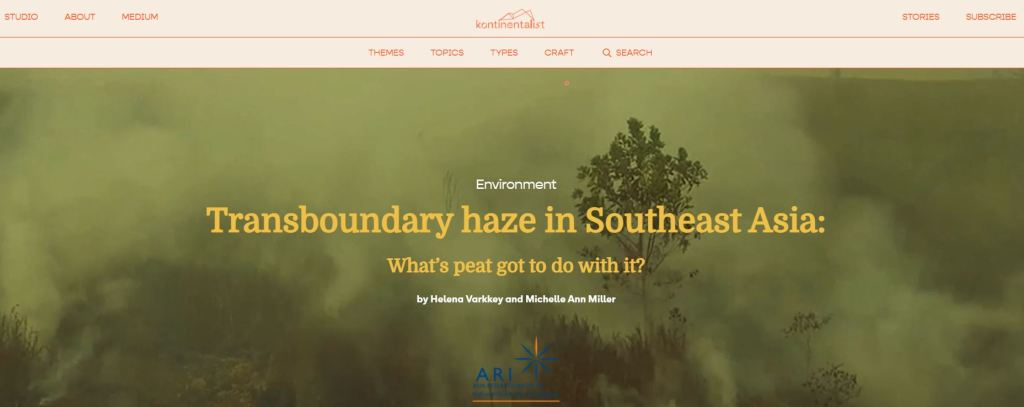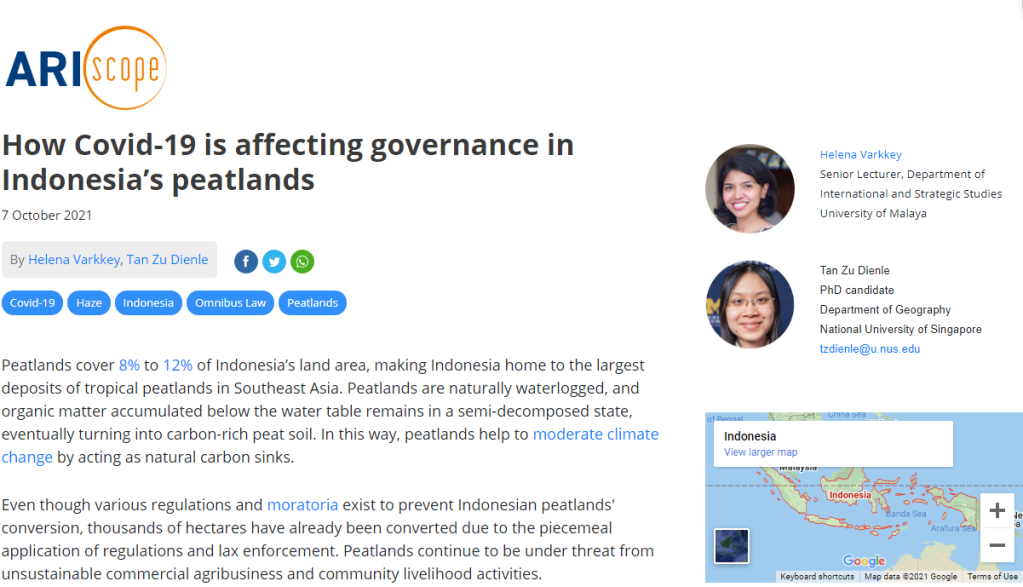I wrote an opinion piece in Australian Outlook, the Australian Institute of International Affairs blog, on sustainability transitions in the Indonesian palm oil sector. The full article can be accessed here.

I wrote an opinion piece in Australian Outlook, the Australian Institute of International Affairs blog, on sustainability transitions in the Indonesian palm oil sector. The full article can be accessed here.

I collaborated with Apichai Sunchindah, an independent development specialist and formerly the Head of the Environmental Division at the ASEAN Secretariat and the Executive Director of the ASEAN Foundation, and Larry Maramis, consultant for international development agencies, and previously served as Director for Cross-Sectoral Cooperation at the ASEAN Secretariat and was the Project Manager for ASEAN’s first Regional Technical Assistance on Transboundary Haze Pollution on a commentary article in Bangkok Post in conjunction with the upcoming 20th anniversary of the ASEAN Agreement on Transboundary Haze Pollution. The complete article can be assessed here.


I recently contributed to a commentary about the importance of reducing methane emissions for the climate in Malaysia’s only science newspaper, The Petri Dish. This commentary was written as one of the outputs of a project with the Environmental Defense Fund and CERAH Clean Air Society focusing on stakeholder engagement and public awareness to promote greater policy ambition towards reduced methane emissions. The whole article can be accessed here.
Below is an excerpt from a commentary that I wrote for 360info, a news wire service based in Monash University. The entire article is available here.
As Southeast Asia emerges from two years of COVID-19-induced socioeconomic slowdowns and the dry season begins, governments across the region are warning their citizens to brace themselves for the return of forest-fire haze.
The clock is ticking as the Association of Southeast Asian Nations (ASEAN) works to develop a new Haze-Free Roadmap after an independent review found that the vision of the original roadmap, of a “Haze-Free ASEAN by 2020”, has not been fully achieved.
Haze severely disrupts regional economies by reducing productivity and tourism while increasing emergency medical spending. The 2015 haze was estimated to have cost US$16 billion in Indonesia alone, while a less severe episode in 2019 cost an estimated US$5 billion.
The biomass particles making up the haze are extremely dangerous to human health. As small as 2.5 microns, the particles can easily enter the lungs and bloodstream. This can cause short- and long-term respiratory, dermatological and ophthalmological problems, especially in young children and adults.
The 2015 haze episode caused 40,000 to 100,000 additional deaths in Indonesia, Malaysia and Singapore, according to studies. And recent research suggests people regularly exposed to significant levels of air pollution can be more susceptible to diseases such as COVID-19.
With Southeast Asians having already spent decades intermittently breathing in smoke haze, the return of this form of air pollution is of great concern.

I have published a commentary covering recent civil society efforts in Indonesia, Thailand, and Malaysia in holding their governments more accountable for their citizens’ right to clean air. The article notably goes into some detail about the CERAH Coalition’s complaint on the topic, which was submitted to the Human Rights Commission of Malaysia (SUHAKAM), and which I was involved in developing.

You can read the full article here. I have also written previously in Heinrich-Boll Stiftung about Malaysia’s climate commitments, accessible here.
Dr Michelle Miller and I collaborated with the talented digital creators at Kontinentalist to create an interactive article on “Transboundary Haze in Southeast Asia: What’s Peat Got To Do with It?”. This article features interactive maps, charts, and infographics to better communicate the complexities of this problem and its solutions in the region. View the full article here.

In conjunction with the Year of the Tiger, I collaborated with Dr Benjamin Loh from the School of Media and Communication in Taylor’s University Malaysia to write this opinion piece. Read the full article here.
I co-authored a commentary with Dr Patrick O’Reilly (University of Leicester) and Dr Shofwan Al-Banna Choiruzzad critiquing the practise of academic funding flowing primarily from the North to the South. We argue that Southern researchers should be more conscious and interrogative of the inherent power and practise asymmetries that come with such funding. The full article can be accessed here.

I have been invited to join the Indo-Pacific Circle, a knowledge and networking platform for early- and mid-career academics and researchers from and working on issues concerning the Indo-Pacific region. The network was launched in February 2022. For the launch, I contributed a short Op-Ed about air pollution and climate change in the Indo-Pacific. You can read the op-ed here.
Tan Zu Dienle is working together with me on the Work Package on Biomass Burning/Haze in the Sustainable Development of Transboundary Environmental Commons in Southeast Asia (TECSEA) project at Asia Research Institute, NUS. During my time as a Visiting Senior Research Fellow at ARI, I have worked with Zu on a commentary on the effect of Covid-19 on Indonesia’s peatland governance. The commentary has been published here.
